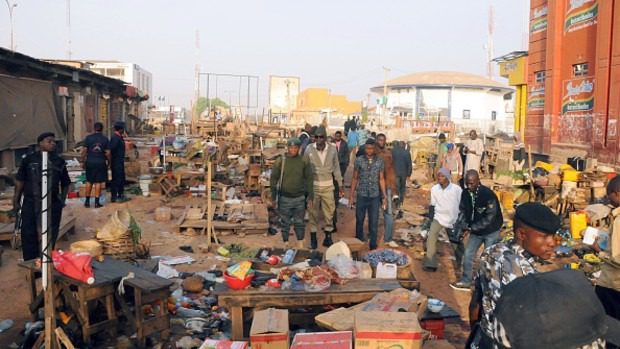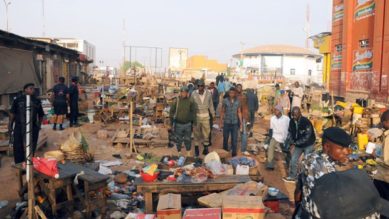Global Issues
Uniting Against Boko Haram

In France, terrorist attacks killing 17 triggered a demonstration of support by dozens of world leaders and millions of marchers. In Nigeria, a new attack by Boko Haram terrorists killed hundreds and caused barely a shrug.
French President Francois Hollande called for national unity and ordered more than 10,000 security personnel to protect his country’s schools, public buildings and critical infrastructure. In Nigeria, after the atrocity in the northeastern town of Baga, President Goodluck Jonathan was all but silent -– just as he stayed mute for weeks last spring after Boko Haram kidnapped more than 200 schoolgirls.
Hollande’s call for unity was hardly necessary: In France, solidarity comes naturally in the face of such a crime. In Nigeria, it does not. History has carved deep sectarian, ethnic and economic fissures across the country. Governments, both military and civilian, have failed to close them. The parties contesting next month’s elections must strive to change this. Boko Haram cannot be defeated otherwise.
The group has been ruthless in its efforts to carve out an Islamic republic in northern Nigeria and the surrounding region. The conflict has already claimed as many as 20,000 casualties, displaced more than 300,000 people and disrupted the lives of millions more. There are no bounds to the depravity of a movement that uses children as suicide bombers. Yet the brutality, venality and incompetence of Nigeria’s government and security forces have empowered the enemy.
Nigeria is Africa’s most populous country, its largest economy and its biggest producer of oil. It has vast economic potential — but poverty is nearly three times more prevalent in the Muslim north than in the Christian south. Long-standing animosities divide followers of the two faiths, as well as herders from farmers, settlers from so-called indigenes, tribes of the oil-bearing Niger Delta from those of other parts of the country. “Corruption is so pervasive in Nigeria,” reported Human Rights Watch, “that it has turned public service for many into a kind of criminal enterprise.”
The head of Nigeria’s central bank once estimated that 10 percent of gross domestic product was lost each year to fraud. About the same proportion of the country’s oil is simply stolen. The army and police are notoriously abusive. The U.S. State Department has compiled information about human-rights abuses that implicates about half the units in the Nigerian military.
Boko Haram’s emergence in Nigeria’s poor northeast was no accident. Its origins lie in legitimate grievances, and its quest for an Islamic state with sharia courts began nonviolently. After bloody clashes between Christians and Muslims and growing repression by security forces, the movement took a more radical turn. In 2009, more than 700 were killed in a crackdown; the group’s leader, Mohammed Yusuf, died in police custody. After that, the movement splintered and became more violent, burning schools and churches, and bombing railway stations.
Boko Haram aims to delegitimize next month’s vote by suppressing turnout: Predictably, the violence has worsened ahead of the election. The parties contesting the vote can best respond by toning down their mutual antagonism and bloodthirsty rhetoric. The government must also try harder to provide security for polling places, especially in the north, and speed up its introduction of biometric voting cards. More international observers, deployed for longer, would help.
There’s a limit to what outsiders can do, though. The U.S. and U.K. have curtailed cooperation with Nigeria’s beleaguered army because of human-rights abuses. Specific, vetted units might still be receptive to training and assistance. Beyond that, strengthening the ability of Nigeria’s neighbors to prevent Boko Haram’s incursions might be the best outsiders can do.
After the election on Feb. 14, the winner must start to address the grievances that have fueled not just Boko Haram but also scores of other disenfranchised groups driven to violence by the impunities and inequities that have dimmed Nigeria’s promise. In Nigeria, making common cause against violent extremism won’t be easy, but there’s no hope of peace without it.
> Source


















